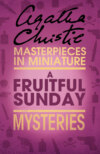Читать книгу: «Clarissa Harlowe; or the history of a young lady — Volume 6», страница 10
LETTER XXIII
MR. LOVELACE, TO JOHN BELFORD, ESQ
But with all this dear creature's resentment against me, I cannot, for my heart, think but she will get all over, and consent to enter the pale with me. Were she even to die to-morrow, and to know she should, would not a woman of her sense, of her punctilio, and in her situation, and of so proud a family, rather die married, than otherwise?—No doubt but she would; although she were to hate the man ever so heartily. If so, there is now but one man in the world whom she can have—and that is me.
Now I talk [familiar writing is but talking, Jack] thus glibly of entering the pale, thou wilt be ready to question me, I know, as to my intentions on this head.
As much of my heart, as I know of it myself, will I tell thee.—When I am from her, I cannot still help hesitating about marriage; and I even frequently resolve against it, and determine to press my favourite scheme for cohabitation. But when I am with her, I am ready to say, to swear, and to do, whatever I think will be the most acceptable to her, and were a parson at hand, I should plunge at once, no doubt of it, into the state.
I have frequently thought, in common cases, that it is happy for many giddy fellows [there are giddy fellows, as well as giddy girls, Jack; and perhaps those are as often drawn in, as these] that ceremony and parade are necessary to the irrevocable solemnity; and that there is generally time for a man to recollect himself in the space between the heated over-night, and the cooler next morning; or I know not who could escape the sweet gypsies, whose fascinating powers are so much aided by our own raised imaginations.
A wife at any time, I used to say. I had ever confidence and vanity enough to think that no woman breathing could deny her hand when I held out mine. I am confoundedly mortified to find that this lady is able to hold me at bay, and to refuse all my honest vows.
What force [allow me a serious reflection, Jack: it will be put down! What force] have evil habits upon the human mind! When we enter upon a devious course, we think we shall have it in our power when we will return to the right path. But it is not so, I plainly see: For, who can acknowledge with more justice this dear creature's merits, and his own errors, than I? Whose regret, at times, can be deeper than mine, for the injuries I have done her? Whose resolutions to repair those injuries stronger?—Yet how transitory is my penitence!—How am I hurried away— Canst thou tell by what?—O devil of youth, and devil of intrigue, how do you mislead me!—How often do we end in occasions for the deepest remorse, what we begin in wantonness!—
At the present writing, however, the turn of the scale is in behalf of matrimony—for I despair of carrying with her my favourite point.
The lady tells Dorcas, that her heart is broken: and that she shall live but a little while. I think nothing of that, if we marry. In the first place, she knows not what a mind unapprehensive will do for her, in a state to which all the sex look forwards with high satisfaction. How often have the whole of the sacred conclave been thus deceived in their choice of a pope; not considering that the new dignity is of itself sufficient to give new life! A few months' heart's ease will give my charmer a quite different notion of things: and I dare say, as I have heretofore said,18 once married, and I am married for life.
I will allow that her pride, in one sense, has suffered abasement: but her triumph is the greater in every other. And while I can think that all her trials are but additions to her honour, and that I have laid the foundations of her glory in my own shame, can I be called cruel, if I am not affected with her grief as some men would be?
And for what should her heart be broken? Her will is unviolated;—at present, however, her will is unviolated. The destroying of good habits, and the introducing of bad, to the corrupting of the whole heart, is the violation. That her will is not to be corrupted, that her mind is not to be debased, she has hitherto unquestionably proved. And if she give cause for farther trials, and hold fast her integrity, what ideas will she have to dwell upon, that will be able to corrupt her morals? What vestigia, what remembrances, but such as will inspire abhorrence of the attempter?
What nonsense then to suppose that such a mere notional violation as she has suffered should be able to cut asunder the strings of life?
Her religion, married, or not married, will set her above making such a trifling accident, such an involuntary suffering fatal to her.
Such considerations as these they are that support me against all apprehensions of bugbear consequences; and I would have them have weight with thee; who are such a doughty advocate for her. And yet I allow thee this; that she really makes too much of it; takes it too much to heart. To be sure she ought to have forgot it by this time, except the charming, charming consequence happen, that still I am in hopes will happen, were I to proceed no farther. And, if she apprehended this herself, then has the dear over-nice soul some reason for taking it so much to heart; and yet would not, I think, refuse to legitimate.
O Jack! had I am imperial diadem, I swear to thee, that I would give it up, even to my enemy, to have one charming boy by this lady. And should she escape me, and no such effect follow, my revenge on her family, and, in such a case, on herself, would be incomplete, and I should reproach myself as long as I lived.
Were I to be sure that this foundation is laid [And why may I not hope it is?] I should not doubt to have her still (should she withstand her day of grace) on my own conditions; nor should I, if it were so, question that revived affection in her, which a woman seldom fails to have for the father of her first child, whether born in wedlock, or out of it.
And pr'ythee, Jack, see in this my ardent hope, a distinction in my favour from other rakes; who, almost to a man, follow their inclinations without troubling themselves about consequences. In imitation, as one would think, of the strutting villain of a bird, which from feathered lady to feathered lady pursues his imperial pleasures, leaving it to his sleek paramours to hatch the genial product in holes and corners of their own finding out.
LETTER XXIV
MR. LOVELACE, TO JOHN BELFORD, ESQ. TUESDAY MORN. JUNE 20
Well, Jack, now are we upon another footing together. This dear creature will not let me be good. She is now authorizing all my plots by her own example.
Thou must be partial in the highest degree, if now thou blamest me for resuming my former schemes, since in that case I shall but follow her cue. No forced construction of her actions do I make on this occasion, in order to justify a bad cause or a worse intention. A slight pretence, indeed, served the wolf when he had a mind to quarrel with the lamb; but this is not now my case.
For here (wouldst thou have thought it?) taking advantage of Dorcas's compassionate temper, and of some warm expressions which the tender-hearted wench let fall against the cruelty of men, and wishing to have it in her power to serve her, has she given her the following note, signed by her maiden name: for she has thought fit, in positive and plain words, to own to the pitying Dorcas that she is not married.
MONDAY, JUNE 19.
I then underwritten do hereby promise, that, on my coming into possession of my own estate, I will provide for Dorcas Martindale in a gentlewoman-like manner, in my own house: or, if I do not soon obtain that possession, or should first die, I do hereby bind myself, my executors, and administrators, to pay to her, or her order, during the term of her natural life, the sum of five pounds on each of the four usual quarterly days in the year; on condition that she faithfully assist me in my escape from an illegal confinement under which I now labour. The first quarterly payment to commence and be payable at the end of three months immediately following the day of my deliverance. And I do also promise to give her, as a testimony of my honour in the rest, a diamond ring, which I have showed her. Witness my hand this nineteenth day of June, in the year above written.
CLARISSA HARLOWE.
Now, Jack, what terms wouldst thou have me to keep with such a sweet corruptress? Seest thou not how she hates me? Seest thou not that she is resolved never to forgive me? Seest thou not, however, that she must disgrace herself in the eye of the world, if she actually should escape? That she must be subjected to infinite distress and hazard! For whom has she to receive and protect her? Yet to determine to risque all these evils! and furthermore to stoop to artifice, to be guilty of the reigning vice of the times, of bribery and corruption! O Jack, Jack! say not, write not another word in her favour!
Thou hast blamed me for bringing her to this house: but had I carried her to any other in England, where there would have been one servant or inmate capable either of compassion or corruption, what must have been the consequence?
But seest thou not, however, that in this flimsy contrivance, the dear implacable, like a drowning man, catches at a straw to save herself!—A straw shall she find to be the refuge she has resorted to.
LETTER XXV
MR. LOVELACE, TO JOHN BELFORD, ESQ. TUES. MORN. TEN O'CLOCK
Very ill—exceedingly ill—as Dorcas tells me, in order to avoid seeing me—and yet the dear soul may be so in her mind. But is not that equivocation? Some one passion predominating in every human breast, breaks through principle, and controuls us all. Mine is love and revenge taking turns. Her's is hatred.—But this is my consolation, that hatred appeased is love begun; or love renewed, I may rather say, if love ever had footing here.
But reflectioning apart, thou seest, Jack, that her plot is beginning to work. To-morrow is to break out.
I have been abroad, to set on foot a plot of circumvention. All fair now, Belford!
I insisted upon visiting my indisposed fair-one. Dorcas made officious excuses for her. I cursed the wench in her hearing for her impertinence; and stamped and made a clutter; which was improved into an apprehension to the lady that I would have flung her faithful confidante from the top of the stairs to the bottom.
He is a violent wretch!—But, Dorcas, [dear Dorcas, now it is,] thou shalt have a friend in me to the last day of my life.
And what now, Jack, dost think the name of her good angel is!—Why Dorcas Martindale, christian and super (no more Wykes) as in the promissory note in my former—and the dear creature has bound her to her by the most solemn obligations, besides the tie of interest.
Whither, Madam, do you design to go when you get out of this house?
I will throw myself into the first open house I can find; and beg protection till I can get a coach, or a lodging in some honest family.
What will you do for clothes, Madam? I doubt you'll be able to take any away with you, but what you'll have on.
O, no matter for clothes, if I can but get out of this house.
What will you do for money, Madam? I have heard his honour express his concern, that he could not prevail upon you to be obliged to him, though he apprehended that you must be short of money.
O, I have rings and other valuables. Indeed I have but four guineas, and two of them I found lately wrapt up in a bit of lace, designed for a charitable use. But now, alas! charity begins at home!—But I have one dear friend left, if she be living, as I hope in God she is! to whom I can be obliged, if I want. O Dorcas! I must ere now have heard from her, if I had had fair play.
Well, Madam, your's is a hard lot. I pity you at my heart!
Thank you, Dorcas!—I am unhappy, that I did not think before, that I might have confided in thy pity, and in thy sex!
I pitied you, Madam, often and often: but you were always, as I thought, diffident of me. And then I doubted not but you were married; and I thought his honour was unkindly used by you. So that I thought it my duty to wish well to his honour, rather than to what I thought to be your humours, Madam. Would to Heaven that I had known before that you were not married!—Such a lady! such a fortune! to be so sadly betrayed;——
Ah, Dorcas! I was basely drawn in! My youth—my ignorance of the world —and I have some things to reproach myself with when I look back.
Lord, Madam, what deceitful creatures are these men!—Neither oaths, nor vows—I am sure! I am sure! [and then with her apron she gave her eyes half a dozen hearty rubs] I may curse the time that I came into this house!
Here was accounting for her bold eyes! And was it not better for Dorcas to give up a house which her lady could not think worse of than she did, in order to gain the reputation of sincerity, than by offering to vindicate it, to make her proffered services suspected.
Poor Dorcas!—Bless me! how little do we, who have lived all our time in the country, know of this wicked town!
Had I been able to write, cried the veteran wench, I should certainly have given some other near relations I have in Wales a little inkling of matters; and they would have saved me from——from——from——
Her sobs were enough. The apprehensions of women on such subjects are ever aforehand with speech.
And then, sobbing on, she lifted her apron to her face again. She showed me how.
Poor Dorcas!—Again wiping her own charming eyes.
All love, all compassion, is this dear creature to every one in affliction but me.
And would not an aunt protect her kinswoman?—Abominable wretch!
I can't—I can't—I can't—say, my aunt was privy to it. She gave me good advice. She knew not for a great while that I was—that I was—that I was—ugh!—ugh!—ugh!—
No more, no more, good Dorcas—What a world do we live in!—What a house am I in!—But come, don't weep, (though she herself could not forbear:) my being betrayed into it, though to my own ruin, may be a happy event for thee: and, if I live, it shall.
I thank you, my good lady, blubbering. I am sorry, very sorry, you have had so hard a lot. But it may be the saving of my soul, if I can get to your ladyship's house. Had I but known that your ladyship was not married, I would have eat my own flesh, before——before——before——
Dorcas sobbed and wept. The lady sighed and wept also.
But now, Jack, for a serious reflection upon the premises.
How will the good folks account for it, that Satan has such faithful instruments, and that the bond of wickedness is a stronger bond than the ties of virtue; as if it were the nature of the human mind to be villanous? For here, had Dorcas been good, and been tempted as she was tempted to any thing evil, I make no doubt but she would have yielded to the temptation.
And cannot our fraternity in an hundred instances give proof of the like predominance of vice over virtue? And that we have risked more to serve and promote the interests of the former, than ever a good man did to serve a good man or a good cause? For have we not been prodigal of life and fortune? have we not defied the civil magistrate upon occasion? and have we not attempted rescues, and dared all things, only to extricate a pounded profligate?
Whence, Jack, can this be?
O! I have it, I believe. The vicious are as bad as they can be; and do the Devil's work without looking after; while he is continually spreading snares for the others; and, like a skilful angler, suiting his baits to the fish he angles for.
Nor let even honest people, so called, blame poor Dorcas for her fidelity in a bad cause. For does not the general, who implicitly serves an ambitious prince in his unjust designs upon his neighbours, or upon his own oppressed subjects; and even the lawyer, who, for the sake of a paltry fee, undertakes to whiten a black cause, and to defend it against one he knows to be good, do the very same thing as Dorcas? And are they not both every whit as culpable? Yet the one shall be dubbed a hero, the other called an admirable fellow, and be contended for by every client, and his double-tongued abilities shall carry him through all the high preferments of the law with reputation and applause.
Well, but what shall be done, since the lady is so much determined on removing!—Is there no way to oblige her, and yet to make the very act subservient to my other views? I fancy such a way may be found out.
I will study for it——
Suppose I suffer her to make an escape? Her heart is in it. If she effect it, the triumph she will have over me upon it will be a counterbalance for all she has suffered.
I will oblige her if I can.
LETTER XXVI
MR. LOVELACE, TO JOHN BELFORD, ESQ
Tired with a succession of fatiguing days and sleepless nights, and with contemplating the precarious situation I stand in with my beloved, I fell into a profound reverie; which brought on sleep; and that produced a dream; a fortunate dream; which, as I imagine, will afford my working mind the means to effect the obliging double purpose my heart is now once more set upon.
What, as I have often contemplated, is the enjoyment of the finest woman in the world, to the contrivance, the bustle, the surprises, and at last the happy conclusion of a well-laid plot!—The charming round-abouts, to come to the nearest way home;—the doubts; the apprehensions; the heart-achings; the meditated triumphs—these are the joys that make the blessing dear.—For all the rest, what is it?—What but to find an angel in imagination dwindled down to a woman in fact?——But to my dream——
Methought it was about nine on Wednesday morning that a chariot, with a dowager's arms upon the doors, and in it a grave matronly lady [not unlike mother H. in the face; but, in her heart, Oh! how unlike!] stopped at a grocer's shop, about ten doors on the other side of the way, in order to buy some groceries: and methought Dorcas, having been out to see if the coast were clear for her lady's flight, and if a coach were to be got near the place, espied the chariot with the dowager's arms, and this matronly lady: and what, methought, did Dorcas, that subtle traitress, do, but whip up to the old matronly lady, and lifting up her voice, say, Good my Lady, permit me one word with your Ladyship!
What thou hast to say to me, say on, quoth the old lady; the grocer retiring, and standing aloof, to give Dorcas leave to speak; who, methought, in words like these accosted the lady:
'You seem, Madam, to be a very good lady; and here, in this neighbourhood, at a house of no high repute, is an innocent lady of rank and fortune, beautiful as a May morning, and youthful as a rose-bud, and full as sweet and lovely, who has been tricked thither by a wicked gentleman, practised in the ways of the town, and this very night will she be ruined if she get not out of his hands. Now, O Lady! if you will extend your compassionate goodness to this fair young lady, in whom, the moment you behold her, you will see cause to believe all I say, and let her but have a place in your chariot, and remain in your protection for one day only, till she can send a man and horse to her rich and powerful friends, you may save from ruin a lady who has no equal for virtue as well as beauty.'
Methought the old lady, moved with Dorcas's story, answered and said, 'Hasten, O damsel, who in a happy moment art come to put it in my power to serve the innocent and virtuous, which it has always been my delight to do: hasten to this young lady, and bid her hie hither to me with all speed; and tell her, that my chariot shall be her asylum: and if I find all that thou sayest true, my house shall be her sanctuary, and I will protect her from all her oppressors.'
Hereupon, methought, this traitress Dorcas hied back to the lady, and made report of what she had done. And, methought, the lady highly approved of Dorcas's proceeding and blessed her for her good thought.
And I lifted up mine eyes, and behold the lady issued out of the house, and without looking back, ran to the chariot with the dowager's coat upon it; and was received by the matronly lady with open arms, and 'Welcome, welcome, welcome, fair young lady, who so well answer the description of the faithful damsel: and I will carry you instantly to my house, where you shall meet with all the good usage your heart can wish for, till you can apprize your rich and powerful friends of your past dangers, and present escape.'
'Thank you, thank you, thank you, thank you, worthy, thrice worthy lady, who afford so kindly your protection to a most unhappy young creature, who has been basely seduced and betrayed, and brought to the very brink of destruction.'
Methought, then, the matronly lady, who had, by the time the young lady came to her, bought and paid for the goods she wanted, ordered her coachman to drive home with all speed; who stopped not till he had arrived in a certain street not far from Lincoln's-inn-fields, where the matronly lady lived in a sumptuous dwelling, replete with damsels who wrought curiously in muslins, cambrics, and fine linen, and in every good work that industrious damsels love to be employed about, except the loom and the spinning-wheel.
And, methought, all the way the young lady and the old lady rode, and after they came in, till dinner was ready, the young lady filled up the time with the dismal account of her wrongs and her sufferings, the like of which was never heard by mortal ear; and this in so moving a manner, that the good old lady did nothing but weep, and sigh, and sob, and inveigh against the arts of wicked men, and against that abominable 'Squire Lovelace, who was a plotting villain, methought she said; and more than that, an unchained Beelzebub.
Methought I was in a dreadful agony, when I found the lady had escaped, and in my wrath had like to have slain Dorcas, and our mother, and every one I met. But, by some quick transition, and strange metamorphosis, which dreams do not usually account for, methought, all of a sudden, this matronly lady turned into the famous mother H. herself; and, being an old acquaintance of mother Sinclair, was prevailed upon to assist in my plot upon the young lady.
Then, methought, followed a strange scene; for mother H. longing to hear more of the young lady's story, and night being come, besought her to accept of a place in her own bed, in order to have all the talk to themselves. For, methought, two young nieces of her's had broken in upon them, in the middle of the dismal tale.
Accordingly, going early to bed, and the sad story being resumed, with as great earnestness on one side as attention on the other, before the young lady had gone far in it, mother H. methought was taken with a fit of the colic; and her tortures increasing, was obliged to rise to get a cordial she used to find specific in this disorder, to which she was unhappily subject.
Having thus risen, and stept to her closet, methought she let fall the wax taper in her return; and then [O metamorphosis still stranger than the former! what unaccountable things are dreams!] coming to bed again in the dark, the young lady, to her infinite astonishment, grief, and surprise, found mother H. turned into a young person of the other sex; and although Lovelace was the abhorred of her soul, yet, fearing it was some other person, it was matter of consolation to her, when she found it was no other than himself, and that she had been still the bed-fellow of but one and the same man.
A strange promiscuous huddle of adventures followed, scenes perpetually shifting; now nothing heard from the lady, but sighs, groans, exclamations, faintings, dyings—From the gentleman, but vows, promises, protestations, disclaimers of purposes pursued, and all the gentle and ungentle pressures of the lover's warfare.
Then, as quick as thought (for dreams, thou knowest confine not themselves to the rules of the drama) ensued recoveries, lyings-in, christenings, the smiling boy, amply, even in her own opinion, rewarding the suffering mother.
Then the grandfather's estate yielded up, possession taken of it: living very happily upon it: her beloved Norton her companion; Miss Howe her visiter; and (admirable! thrice admirable!) enabled to compare notes with her; a charming girl, by the same father, to her friend's charming boy; who, as they grow up, in order to consolidate their mamma's friendships, (for neither have dreams regard to consanguinity,) intermarry; change names by act of parliament, to enjoy my estate—and I know not what of the like incongruous stuff.
I awoke, as thou mayest believe, in great disorder, and rejoiced to find my charmer in the next room, and Dorcas honest.
Now thou wilt say this was a very odd dream. And yet, (for I am a strange dreamer,) it is not altogether improbable that something like it may happen; as the pretty simpleton has the weakness to confide in Dorcas, whom till now she disliked.
But I forgot to tell thee one part of my dream; and that was, that, the next morning, the lady gave way to such transports of grief and resentment, that she was with difficulty diverted from making an attempt upon her own life. But, however, at last was prevailed upon to resolve to live, and make the best of the matter: a letter, methought, from Captain Tomlinson helping to pacify her, written to apprize me, that her uncle Harlowe would certainly be at Kentish-town on Wednesday night, June 28, the following day (the 29th) being his birth-day; and be doubly desirous, on that account, that our nuptials should be then privately solemnized in his presence.
But is Thursday, the 29th, her uncle's anniversary, methinks thou askest? —It is; or else the day of celebration should have been earlier still. Three weeks ago I heard her say it was: and I have down the birthday of every one in the family, and the wedding-day of her father and mother. The minutest circumstances are often of great service in matters of the last importance.
And what sayest thou now to my dream?
Who says that, sleeping and waking, I have not fine helps from somebody, some spirit rather, as thou'lt be apt to say? But no wonder that a Beelzebub has his devilkins to attend his call.
I can have no manner of doubt of succeeding in mother H.'s part of the scheme; for will the lady (who resolves to throw herself into the first house she can enter, or to bespeak the protection of the first person she meets, and who thinks there can be no danger out of this house, equal to what she apprehends from me in it) scruple to accept of the chariot of a dowager, accidentally offered? and the lady's protection engaged by her faithful Dorcas, so highly bribed to promote her escape?—And then Mrs. H. has the air and appearance of a venerable matron, and is not such a forbidding devil as Mrs. Sinclair.
The pretty simpleton knows nothing in the world; nor that people who have money never want assistants in their views, be they what they will. How else could the princes of the earth be so implicitly served as they are, change they hands every so often, and be their purposes ever so wicked.
If I can but get her to go on with me till Wednesday next week, we shall be settled together pretty quietly by that time. And indeed if she has any gratitude, and has in her the least of her sex's foibles, she must think I deserve her favour, by the pains she has cost me. For dearly do they all love that men should take pains about them and for them.
And here, for the present, I will lay down my pen, and congratulate myself upon my happy invention (since her obstinacy puts me once more upon exercising it.)—But with this resolution, I think, that, if the present contrivance fail me, I will exert all the faculties of my mind, all my talents, to procure for myself a regal right to her favour and that in defiance of all my antipathies to the married state; and of the suggestions of the great devil out of the house, and of his secret agents in it.—Since, if now she is not to be prevailed upon, or drawn in, it will be in vain to attempt her further.
See Letter IX. of this volume.
[Закрыть]
Покупайте книги и получайте бонусы в Литрес, Читай-городе и Буквоеде.
Участвовать в бонусной программе




















